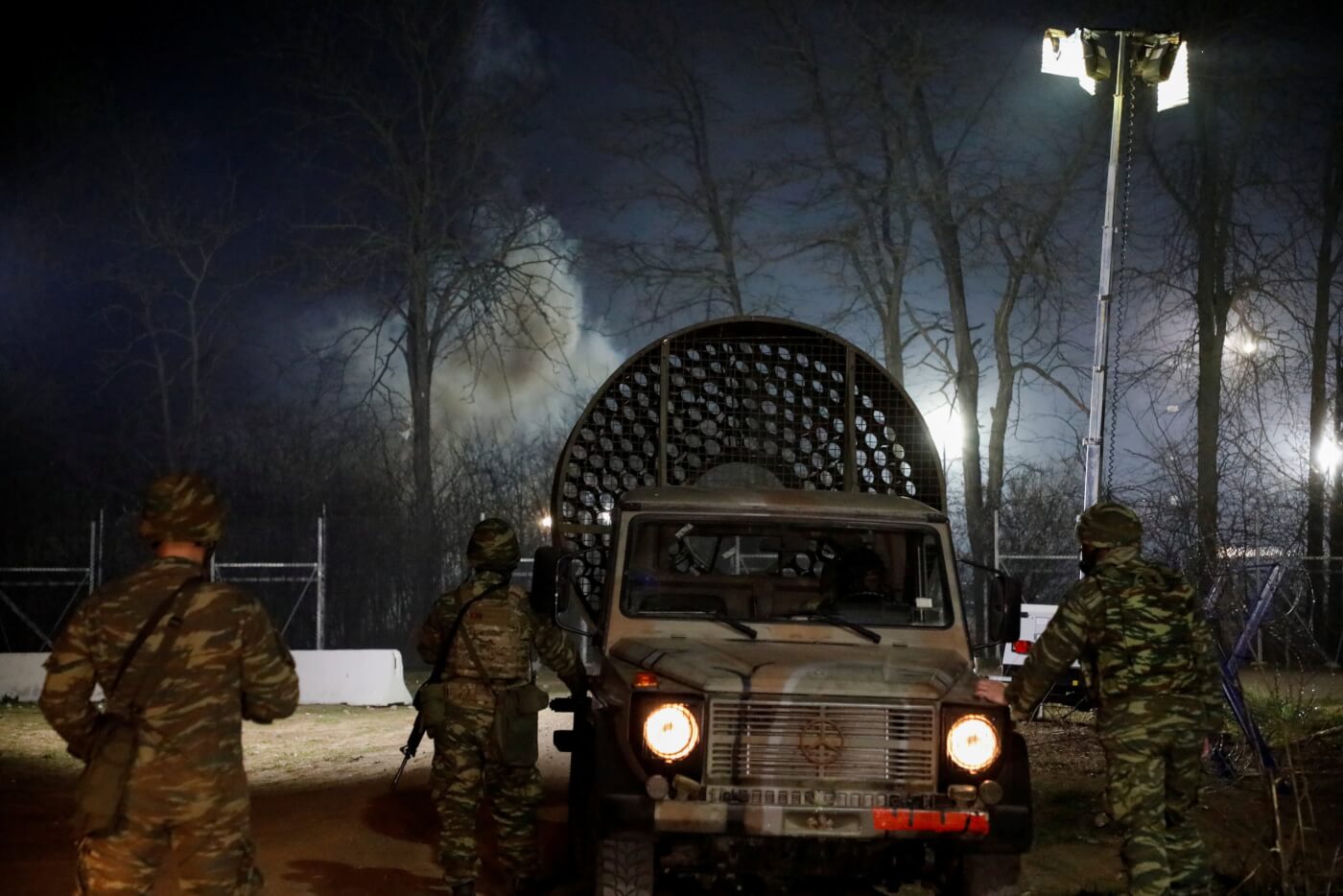New research released by Amnesty International on Friday (3 April 2020) details the widespread abuse and violence subjected to migrants at the Greek-Turkish border. The report – titled Caught in a Political Game – finds that at least two men have been killed and a woman remains missing since Turkish President Erdogan opened up the borders on 27 February 2020.
Turkish authorities were found to have “recklessly encouraged” migrants to travel to Greece under false pretences, resulting in thousands of people swarming to the Greek border. The authorities in Turkey have in many cases facilitated their movement.
Some asylum seekers have even given up their accommodation in Turkey and are spending all of their money to make the journey.
However, Greek authorities are opposed to these crossings and have attempted to repress the movement of people by increasing border security. This has seen police and army forces from both nations posted along the border equipped with tear gas, water cannons, plastic bullets and live ammunition.
The implementation of the Greek government’s policy to repel instead of processing asylum claims has even been extended to migrants who have successfully entered into Greek territory, in violation of human rights law.
Efforts to repel crossings has led to violent clashes along the border between Turkish and Greek authorities, with migrants caught in the crossfire and in many cases specifically targeted.
Massimo Moratti, Deputy Director of the Amnesty International Europe Regional Office, said:
“People travelled from Turkey to Greece to seek safety, yet they were met with violence so serious that at least two were tragically killed. Allegations of violence must be promptly and impartially investigated. Everyone should be treated humanely, shielded from violence and be granted access to protection in the countries where they are seeking safety”
Muhammad Gulzari, a 43 year-old man from Pakistan, was shot in the chest as he attempted to cross at the Pazarkule/Kastanies border. He was later pronounced dead in a Turkish hospital on 4 March 2020. Five others were also injured with gunshot wounds.
Muhammad al-Arab, a 22-year old Syrian man, was also killed in the surrounding area.
Another Syrian national, whose name has not been revealed, is missing and presumed dead after being separated from her husband and their six children at the Evros/Meriç river, south of Edirne. Greek soldiers began firing shots towards the woman while she was attempting to cross the river and enter Greece.
The Greek authorities subsequently detained her husband and children, stripping them of their possessions before putting them back on a wooden boat that returned them to the Turkish side of the river.
Other cases of maltreatment include migrants being beaten with truncheons, being robbed of money and possessions and arbitrary detention that sometimes lasts several days. Russia Today has posted videos of Greek coastguards firing bullets at a rubber dinghy containing people seeking refuge in Greece.
Human Rights Watch have also denounced Greece for it’s “draconian policy” towards 450 migrants being detained on a naval ship docked in Mytilene port in Lesbos.
A statement by the group said:
“Greece’s decision to detain more than 450 people on a naval vessel and refuse to allow them to lodge asylum claims flagrantly violates international and European law.. The action may amount to an arbitrary deprivation of liberty.”
In response to Turkey opening the borders, Greece passed emergency legislation suspending all new Asylum applications in the country for one month. While the act ceased to have effect yesterday (2 April 2020), Greek Asylum Service operations remain suspended as a result of COVID-19, meaning that people seeking to apply for asylum continue to be prevented from doing so.
Everybody who has arrived in Greece and the neighbouring islands after 1 March 2020 when the emergency legislation was passed are now being arbitrarily held in port facilities and detention centres on the mainland, unable to claim asylum. This includes around 500 people – of which over 200 are children – in Lesvos alone.
Massimo Moratti said:
“Greece must now quickly change course and allow all new arrivals to access asylum procedures and basic services. They must move people from detention facilities and unsanitary camps to safe and adequate accommodation. The rapid spread of COVID-19 has only made that more urgent” … European countries should effectively and meaningfully relocate asylum seekers from Greece and resettle refugees from Turkey. With the correct public health checks and quarantines in place, COVID-19 need not be a barrier to providing safety to people forced to flee their homes”
The situation on the Greek-Turkish borders garnered international attention when President Erdogan opened the borders, however the global coronavirus pandemic has pulled the eyes of the media away from the deteriorating situation. The focus of the European Union has also shifted – somewhat understandably – but it remains crucial that both Greece and Turkey are forced to uphold their international commitments to human rights.
Speaking on this issue for the LSE Blog, Violetta Enria and Sarah Gerwens wrote:
“With media attention declining, the violence at the border, diplomatic disagreements, policy impasse and human suffering persist. Meanwhile, the same Commission that has made promoting a ‘European way of life’ including the values of tolerance and justice a core priority has done little to address the breaches of European and international law occurring at the Union’s own borders.”


